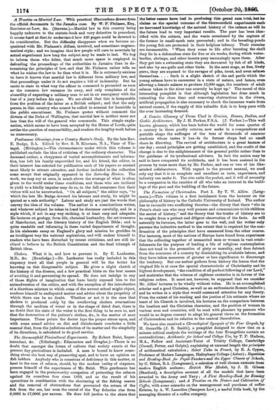The Formation of Christendom. Part I. By T. W. Allies.
(Long- mans.)—This volume is a first instalment from the lecturer on the philosophy of history in the Catholic University of Ireland. The author has to reconcile two conflicting theories—the theory that there "sits in Peter's chair one who may well possess and communicate to his children the secret of history," and the theory that the-truths of history are to. be sought from a patient and diligent observation of the facts. As will naturally be foreseen, the latter goes to the wall, and the writer only pursues the inductive method to the extent that is required for the con- firmation of the principlea.that have emanated from the other sourom For instance, most of the nations of Europe have found from experience- that the collecting together of unmarried men or women in vast estab- lishments for the purpose of leading a life of religious contemplation does not tend to the promotion of piety or morality, and does detract from the resources of a country by diminishing its available labour, and they have taken measures of greater or less significance to discourage the tendency. But our author gathers from history the lesson that the virginal life is at once the special characteristic of Christianity and its highest development, "the condition of all perfect following of our Lord," and maintains that the winless of eighteen centuries is in favour of the religious orders. It must not, however, be supposed that we consider Mr. Allies' lectures to be wholly without value. He is an accomplished scholar and a good Christian, as well as an enthusiastic Roman Catholic j. and he writes in a style that would eommand attention for any theory. From the extent of his reading and the justice of his estimate where Ito tenet of his Church is involved, his lectures on the comparison between the heathen and the Christian character, and the position of women in various eras and countries, will be read with pleasure by persons who. would in no degree consent to adopt his general views on the formation of Christendom and its relation to the central Sacerdotium.






























 Previous page
Previous page